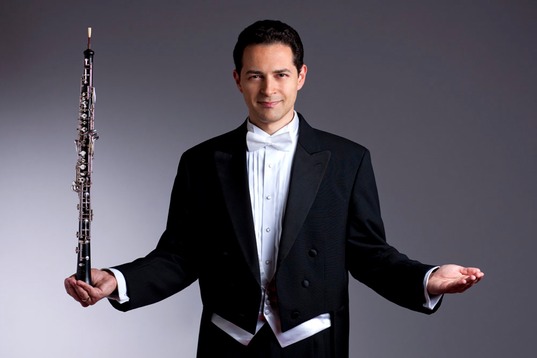Two guest artists bring gracious spirit to New World chamber program

Eugene Izotov, principal oboe of the Chicago Symphony Orchestra, performed Mozart with New World Symphony members on Sunday. Photo: Todd Rosenberg
While many great composers are remembered for their timeless masterpieces, divertissements or entertainment music was also an important part of their creative output. The New World Symphony’s chamber music concert on Sunday afternoon featured three works from that genre replete with spirited melodies and gracious writing bearing the composers’ distinctive musical imprint.
Mozart revised and adapted many of his scores for different instrumental combinations. The Serenade in C minor for eight winds, written in 1782-83, later became a String Quintet (with two violas). In 2000 the oboist Humbert Lucarelli turned that score into a Quintet in C minor for oboe and strings, the oboe replacing the first violin part of Mozart’s string version. Lucarelli’s transcription was the concert’s centerpiece, bringing Eugene Izotov, principal oboe of the Chicago Symphony Orchestra, to the New World Center stage.
Lucarelli’s hybrid arrangement casts the score in a different light from the original wind version which is the most frequently performed edition of the work. The combination of solo oboe and string quartet gives the music a dramatically intense, even romantic aura similar to Mozart’s Symphony No. 40 in G minor and two piano concertos in minor keys. The almost operatic theme of the Andante becomes a long spun oboe melody and the lively subject of the fourth movement’s theme and variations resounds with dark undertones, the second variation turning melancholy.
Izotov’s flawless intonation, agility and sweetness and depth of tone made a strong case for this retooling of Mozart’s inventive score. A patrician ensemble player, his playing was a model of Classical style and supple restraint, always blended with the strings. In the trio section of the third movement, the smooth and balanced teamwork of Izotov and violinists Colleen McCullough and Jin Suk Yu, violist Emilee Newell and cellist Maaike Harding was especially felicitous. McCullough’s violin solo in the second movement matched Izotov for elegance and singing line.
The Septet in E-flat Major might be described as Beethoven’s party piece of 1799. In the spirit of Mozart’s serenades and divertimentos , the score displays the lighter side of the future titan. Despite the abundance of catchy themes in Beethoven’s chock-full-of-tunes score, the chamber combination of three winds and four strings was innovative and the dramatic interplay between the instruments in the opening Adagio suggests the introductions of Beethoven’s early symphonies.
Violinist Ani Kavafian has to be one of the music world’s busiest artists. A professor at Yale University, Kavafian is a longtime member of the Chamber Music Society of Lincoln Center, concertmaster of the New Haven Symphony, member of the touring Trio da Salo and Kavafian-Schub-Shifrin Trio as well as a frequent guest at several chamber music festivals.
Kavafian played the crucial violin part and led the Beethoven septet with incisive vigor, her precision and musicianship undiminished. She dug into the melodic lines, adopting a faster, less Mozartean approach to the minuet and bringing a fine sense of contrast and definition to the fourth movement’s variations. Kavafian blazed through the bravura cadenza of the final Presto, seamlessly fusing the reprise of the bubbly, joyous principal theme.
The New World players matched Kavafian’s finesse. Violist Derek Mosloff and cellist Meredith McCook’s florid solos, David Lemelin’s mellow clarinet motifs and Dominc Rotella’s spot-on horn calls were standouts among a superb ensemble effort.
The concert opened with a bright and snappy reading of Carl Nielsen’s folksy Serenata in Vano, the brio of Brad Whitfield’s octave-spanning clarinet solos particularly delightful.
The New World Symphony chamber series continues 2 p.m. March 16 with members of the New World Symphony playing works by Clara and Robert Schumann, Brahms, Liszt and Chopin. 305-673-3331; nws.edu.
Posted in Performances
Leave a Comment
Mon Jan 27, 2014
at 11:10 am
No Comments






